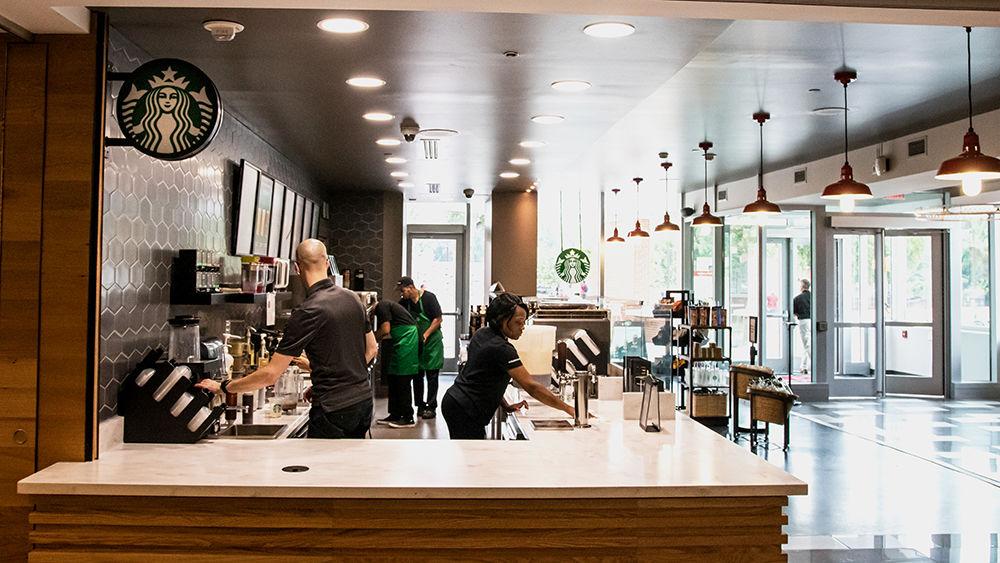While the Starbucks in Talley is a staple for students on campus, it may not be the best part-time job for student workers. Workers at the Starbucks discuss the issues they face with complicated orders and low pay.
Lydia Castillo, a first-year studying communication, has been working at the Talley Starbucks for a little over a month and talks about her experience so far.
“It gets really busy at certain hours, especially since I sometimes work from 8-11 a.m. in the morning,” Castillo said. “Sometimes I end up making three drinks at a time because there’s so many cups and it gets a little overwhelming.”
She said being at the register and taking all of the orders can be difficult during a rush.
“It’s kind of tricky to listen to the customer and then write it down,” Castillo said. “I have to take orders and also do Grubhub orders at the same time. This makes it hard to decide which ones to do first because sometimes the mobile orders are actually ahead of the ones at the bar.”
Castillo said she usually recommends ordering food at the bar over ordering on Grubhub.
“Honestly, I feel like the food is fresher if you just order at the bar,” Castillo said. “Even though a lot of people say that the app is faster, the food takes a little bit longer than the coffee to make.”
When asked to elaborate on this, Castillo said the food would sit there until someone comes to pick it up, but when people get food at the register, they usually stay in the store and get their food as soon as it’s ready.
This leaves more room on the counter for future orders and even though she might not suggest the app for people who want to leave their order there for hours, she said she suggests using Grubhub for drinks because the orders are usually more complex.
“If it’s on Grubhub, everything’s already said on the website and there’s less of a chance of us getting it wrong,” Castillo said. “So it’s actually better because we understand it a bit more.”
Jake Andrichuk, a student manager and second-year in international studies and business administration, said new trainees can read what is listed on Grubhub easier than the abbreviations that are listed on the cup. Andrichuk said he still focuses on training people to learn the acronyms used for drink orders, but that takes time that is not always given in such a fast-paced industry. Instead, he focuses on managing by the Starbucks playbook.
“I strive to encourage new trainees to just jump in and start making drinks,” Andrichuk said. “This gives the company the time to train them while also giving our employees more time to learn.”
Andrichuk then explained how Grubhub can also be confusing and irritating for users in addition to employees.
“It’s not efficient for our users because if we’re out of something, we can’t cancel part of your order,” Andrichuk said. “I know it’s not ideal to have to place another order and re-wait in line, but I would say the only time I wouldn’t suggest Grubhub is when that does happen, and if it does, you can always come to the register.”
Andrichuk said using both Grubhub and the register to take orders can be difficult to manage.
“Grubhub cannot be properly utilized when we are using the hybrid system where we have to use both the register and Grubhub,” Andrichuk said. “I also want to note that the orders from the register do not show up on the Grubhub tablet, meaning, we have to take two different streams of incoming orders, and that can be difficult for our employees to keep up with.”
Andrichuk said the solution to this problem is not an issue with Starbucks, but rather, something that Grubhub should attempt to change.
“Maybe there should be an option to partially cancel your order,” Andrichuk said. “So for example, if we don’t have your sandwich, we can still make your drink.”
Another issue that frequently pops up is certain workers’ time limitations. According to Andrichuk, a lot of international students work at the Talley Starbucks, which isn’t very practical since they can only work a limited 20 hours a week and are limited to working only for the University. This law proves to be a disadvantage for international students who could have been getting paid a lot more from off-campus establishments, but are instead forced to make do with the University’s wages.
“The pay is competitive when compared to the state’s minimum wage, but when you look at the corporate pay, we don’t even begin to compare,” Andrichuk said. “Especially to international students because when you look at the jobs they had before, this is like spending money.”
Despite the lower pay, Andrichuk said he chooses to work an on-campus job because of the people he works with.
“The people make this job, they really do,” Andrichuk said. “I love having conversations with them; they’re brilliant … and so kind.”













